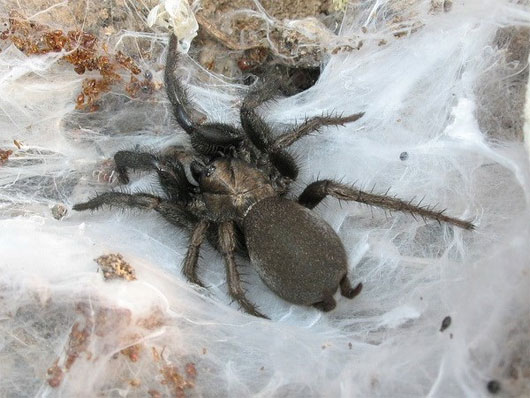Scientists successfully decode the spider's genome
In a study published in the Journal of Natural Media of America on May 6, scientists first published the successful decoding of the spider's genome.
This event uncovers the secrets of spiders that can help produce smarter insecticides and super-durable spider silk.
Biological research team at Aarhus University (Denmark), led by scientist Trine Bilde, analyzed DNA sequences of large black spider species in Southern Europe and the velvet arachnids live in Africa, in which each species represents two main spider groups.

The big black spider in Southern Europe "notorious" is dangerous although its bite only hurts like a bee sting. This species is also called "mygalomorph" , meaning the spider lives on the ground and lurks to wait for its prey. Meanwhile, the velvet spider belongs to the species "araneomorph" , a part of the spider group that has been modified to be more suitable for large habitats higher than the ground, where they live in groups and create public spider web I want to set a trap for insects to fly in.
For a long time, spiders have been a special attention of biologists because they have a combination of outstanding survival skills and abilities. At minimum energy consumption, they can have predators weighing 7 times their weight.
Chemists hope to recreate spider silk, a much more complex and durable protein than steel or kevlar fibers, and use neurotoxins in spider venom, which kill many species. insects, to produce pesticides more effectively.
According to scientist Jesper Bechsgaard, the study provided the most complete picture of the spider genome. More specifically, for venom proteins, the team provides more diversity that can be used for specific purposes.
For spider silk proteins, the team provided many complete gene sequences of different silk types, which could be useful for silk studies, such as bacterial cells.
- Successfully decode the genome of soybeans
- Decode the genome bamboo Moso
- Successfully decode the Ebola virus genome
- Decode the smallest bacterial genome
- For the first time, Vietnam has successfully built the Vietnamese genome
- Many new and rare spiders are found in Australia and India
- Decode the 115-year-old woman's genome
- Use 'natural enemies' to replace pesticides
- Science successfully deciphered the hookworm genome
- There will be many delicious apples thanks to the new genome map
- Spiders re-solidify and birds
- Successfully decoding the genome of a 45,000-year-old man
 Why do potatoes have eyes?
Why do potatoes have eyes? 'Tragedy' the world's largest carnivorous life: Death becomes ... public toilet
'Tragedy' the world's largest carnivorous life: Death becomes ... public toilet Tomatoes were once considered 'poisonous' for 200 years
Tomatoes were once considered 'poisonous' for 200 years Detecting microscopic parasites on human face
Detecting microscopic parasites on human face